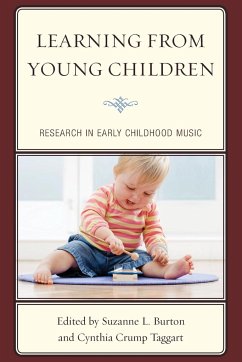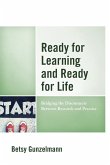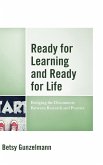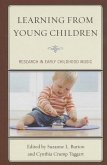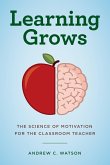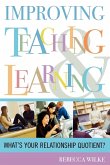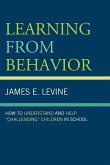- Broschiertes Buch
- Merkliste
- Auf die Merkliste
- Bewerten Bewerten
- Teilen
- Produkt teilen
- Produkterinnerung
- Produkterinnerung
Learning from Young Children: Research in Early Childhood Music presents research on the importance of fostering musical growth during early childhood. With research designs ranging from statistical, mixed methods, survey, content analysis, and case study, to philosophical inquiry, this book will practitioners base their practice in research and offers a wide range of information for scholars and researchers studying early childhood music learning and development.
Andere Kunden interessierten sich auch für
![Ready for Learning and Ready for Life Ready for Learning and Ready for Life]() Betsy GunzelmannReady for Learning and Ready for Life38,99 €
Betsy GunzelmannReady for Learning and Ready for Life38,99 €![Ready for Learning and Ready for Life Ready for Learning and Ready for Life]() Betsy GunzelmannReady for Learning and Ready for Life65,99 €
Betsy GunzelmannReady for Learning and Ready for Life65,99 €![Learning from Young Children Learning from Young Children]() Suzanne L BurtonLearning from Young Children154,99 €
Suzanne L BurtonLearning from Young Children154,99 €![Learning Grows Learning Grows]() Andrew C. WatsonLearning Grows51,99 €
Andrew C. WatsonLearning Grows51,99 €![Improving Teaching and Learning Improving Teaching and Learning]() Rebecca WilkeImproving Teaching and Learning73,99 €
Rebecca WilkeImproving Teaching and Learning73,99 €![Learning From Behavior Learning From Behavior]() James E. LevineLearning From Behavior60,99 €
James E. LevineLearning From Behavior60,99 €![The Learning Equation The Learning Equation]() Daniel WentlandThe Learning Equation109,99 €
Daniel WentlandThe Learning Equation109,99 €-
-
-
Learning from Young Children: Research in Early Childhood Music presents research on the importance of fostering musical growth during early childhood. With research designs ranging from statistical, mixed methods, survey, content analysis, and case study, to philosophical inquiry, this book will practitioners base their practice in research and offers a wide range of information for scholars and researchers studying early childhood music learning and development.
Hinweis: Dieser Artikel kann nur an eine deutsche Lieferadresse ausgeliefert werden.
Hinweis: Dieser Artikel kann nur an eine deutsche Lieferadresse ausgeliefert werden.
Produktdetails
- Produktdetails
- Verlag: Globe Pequot Publishing Group Inc/Bloomsbury
- Seitenzahl: 300
- Erscheinungstermin: 21. Juli 2011
- Englisch
- Abmessung: 229mm x 152mm x 16mm
- Gewicht: 438g
- ISBN-13: 9781607093237
- ISBN-10: 1607093235
- Artikelnr.: 33323153
- Herstellerkennzeichnung
- Books on Demand GmbH
- In de Tarpen 42
- 22848 Norderstedt
- info@bod.de
- 040 53433511
- Verlag: Globe Pequot Publishing Group Inc/Bloomsbury
- Seitenzahl: 300
- Erscheinungstermin: 21. Juli 2011
- Englisch
- Abmessung: 229mm x 152mm x 16mm
- Gewicht: 438g
- ISBN-13: 9781607093237
- ISBN-10: 1607093235
- Artikelnr.: 33323153
- Herstellerkennzeichnung
- Books on Demand GmbH
- In de Tarpen 42
- 22848 Norderstedt
- info@bod.de
- 040 53433511
Suzanne L. Burton is associate professor of music education and director of graduate studies at the University of Delaware. Cynthia Crump Taggart is professor and chair of music education at Michigan State University, where she also directs the Early Childhood Music Program.
Part 1 Part I. Understanding Musical Characteristics Chapter 2 Chapter 1.
Applying Brain Research to Children's Musical Experiences Chapter 3 Chapter
2. Language Acquisition: A Lens on Music Learning Chapter 4 Chapter 3. The
Role of Musical Engagement in the Musicality of 3-year-old Children Part 5
II. Creating Rich Learning Environments Chapter 6 Chapter 4. Building
Community to Elicit Responses in Early Childhood Music Classes Chapter 7
Chapter 5. The Incorporation of Principles of the Reggio Emilia Approach in
a North American Pre-school Music Curriculum Chapter 8 Chapter 6. The
Importance of Parents in Early Childhood Music Program Evaluation Chapter 9
Chapter 7. Elementary Music Teachers' Role-Identities and Perceptions in
Teaching Pre-Kindergarten Students with Special Needs Chapter 10 Chapter 8.
Preschool Children's Uses of a Music Listening Center During Free-Choice
Time Chapter 11 Chapter 9. Tonal Patterns: Providing the Vocabulary for
Comprehensive Vocal Improvisation Part 12 III. Musical Parenting Chapter 13
Chapter 10. Parents' Documentation of Their Children's Music-Related
Behaviors Chapter 14 Chapter 11. Music Play Zone: An Online Social Network
Site Connecting Parents and Teacher in an Early Childhood Music Class
Chapter 15 Chapter 12.Twenty-First Century Parenting, Electronic Media, and
Early Childhood Music Education Part 16 IV. Benefits of Early Music
Instruction Chapter 17 Chapter 13. The Effect of an Age-Appropriate Music
Curriculum on Motor and Linguistic and Non-linguistic Skills of Children
Three to Five Years of Age Chapter 18 Chapter 14. The Impact of a Music and
Movement Program on School Readiness Chapter 19 Chapter 15. The Role of
Early Childhood Music Class Participation in the Development of Four
Children with Speech and Language Delay Chapter 20 Chapter 16.Examining
Music Experiences with Anthony, a Child Who has Autism
Applying Brain Research to Children's Musical Experiences Chapter 3 Chapter
2. Language Acquisition: A Lens on Music Learning Chapter 4 Chapter 3. The
Role of Musical Engagement in the Musicality of 3-year-old Children Part 5
II. Creating Rich Learning Environments Chapter 6 Chapter 4. Building
Community to Elicit Responses in Early Childhood Music Classes Chapter 7
Chapter 5. The Incorporation of Principles of the Reggio Emilia Approach in
a North American Pre-school Music Curriculum Chapter 8 Chapter 6. The
Importance of Parents in Early Childhood Music Program Evaluation Chapter 9
Chapter 7. Elementary Music Teachers' Role-Identities and Perceptions in
Teaching Pre-Kindergarten Students with Special Needs Chapter 10 Chapter 8.
Preschool Children's Uses of a Music Listening Center During Free-Choice
Time Chapter 11 Chapter 9. Tonal Patterns: Providing the Vocabulary for
Comprehensive Vocal Improvisation Part 12 III. Musical Parenting Chapter 13
Chapter 10. Parents' Documentation of Their Children's Music-Related
Behaviors Chapter 14 Chapter 11. Music Play Zone: An Online Social Network
Site Connecting Parents and Teacher in an Early Childhood Music Class
Chapter 15 Chapter 12.Twenty-First Century Parenting, Electronic Media, and
Early Childhood Music Education Part 16 IV. Benefits of Early Music
Instruction Chapter 17 Chapter 13. The Effect of an Age-Appropriate Music
Curriculum on Motor and Linguistic and Non-linguistic Skills of Children
Three to Five Years of Age Chapter 18 Chapter 14. The Impact of a Music and
Movement Program on School Readiness Chapter 19 Chapter 15. The Role of
Early Childhood Music Class Participation in the Development of Four
Children with Speech and Language Delay Chapter 20 Chapter 16.Examining
Music Experiences with Anthony, a Child Who has Autism
Part 1 Part I. Understanding Musical Characteristics Chapter 2 Chapter 1.
Applying Brain Research to Children's Musical Experiences Chapter 3 Chapter
2. Language Acquisition: A Lens on Music Learning Chapter 4 Chapter 3. The
Role of Musical Engagement in the Musicality of 3-year-old Children Part 5
II. Creating Rich Learning Environments Chapter 6 Chapter 4. Building
Community to Elicit Responses in Early Childhood Music Classes Chapter 7
Chapter 5. The Incorporation of Principles of the Reggio Emilia Approach in
a North American Pre-school Music Curriculum Chapter 8 Chapter 6. The
Importance of Parents in Early Childhood Music Program Evaluation Chapter 9
Chapter 7. Elementary Music Teachers' Role-Identities and Perceptions in
Teaching Pre-Kindergarten Students with Special Needs Chapter 10 Chapter 8.
Preschool Children's Uses of a Music Listening Center During Free-Choice
Time Chapter 11 Chapter 9. Tonal Patterns: Providing the Vocabulary for
Comprehensive Vocal Improvisation Part 12 III. Musical Parenting Chapter 13
Chapter 10. Parents' Documentation of Their Children's Music-Related
Behaviors Chapter 14 Chapter 11. Music Play Zone: An Online Social Network
Site Connecting Parents and Teacher in an Early Childhood Music Class
Chapter 15 Chapter 12.Twenty-First Century Parenting, Electronic Media, and
Early Childhood Music Education Part 16 IV. Benefits of Early Music
Instruction Chapter 17 Chapter 13. The Effect of an Age-Appropriate Music
Curriculum on Motor and Linguistic and Non-linguistic Skills of Children
Three to Five Years of Age Chapter 18 Chapter 14. The Impact of a Music and
Movement Program on School Readiness Chapter 19 Chapter 15. The Role of
Early Childhood Music Class Participation in the Development of Four
Children with Speech and Language Delay Chapter 20 Chapter 16.Examining
Music Experiences with Anthony, a Child Who has Autism
Applying Brain Research to Children's Musical Experiences Chapter 3 Chapter
2. Language Acquisition: A Lens on Music Learning Chapter 4 Chapter 3. The
Role of Musical Engagement in the Musicality of 3-year-old Children Part 5
II. Creating Rich Learning Environments Chapter 6 Chapter 4. Building
Community to Elicit Responses in Early Childhood Music Classes Chapter 7
Chapter 5. The Incorporation of Principles of the Reggio Emilia Approach in
a North American Pre-school Music Curriculum Chapter 8 Chapter 6. The
Importance of Parents in Early Childhood Music Program Evaluation Chapter 9
Chapter 7. Elementary Music Teachers' Role-Identities and Perceptions in
Teaching Pre-Kindergarten Students with Special Needs Chapter 10 Chapter 8.
Preschool Children's Uses of a Music Listening Center During Free-Choice
Time Chapter 11 Chapter 9. Tonal Patterns: Providing the Vocabulary for
Comprehensive Vocal Improvisation Part 12 III. Musical Parenting Chapter 13
Chapter 10. Parents' Documentation of Their Children's Music-Related
Behaviors Chapter 14 Chapter 11. Music Play Zone: An Online Social Network
Site Connecting Parents and Teacher in an Early Childhood Music Class
Chapter 15 Chapter 12.Twenty-First Century Parenting, Electronic Media, and
Early Childhood Music Education Part 16 IV. Benefits of Early Music
Instruction Chapter 17 Chapter 13. The Effect of an Age-Appropriate Music
Curriculum on Motor and Linguistic and Non-linguistic Skills of Children
Three to Five Years of Age Chapter 18 Chapter 14. The Impact of a Music and
Movement Program on School Readiness Chapter 19 Chapter 15. The Role of
Early Childhood Music Class Participation in the Development of Four
Children with Speech and Language Delay Chapter 20 Chapter 16.Examining
Music Experiences with Anthony, a Child Who has Autism

